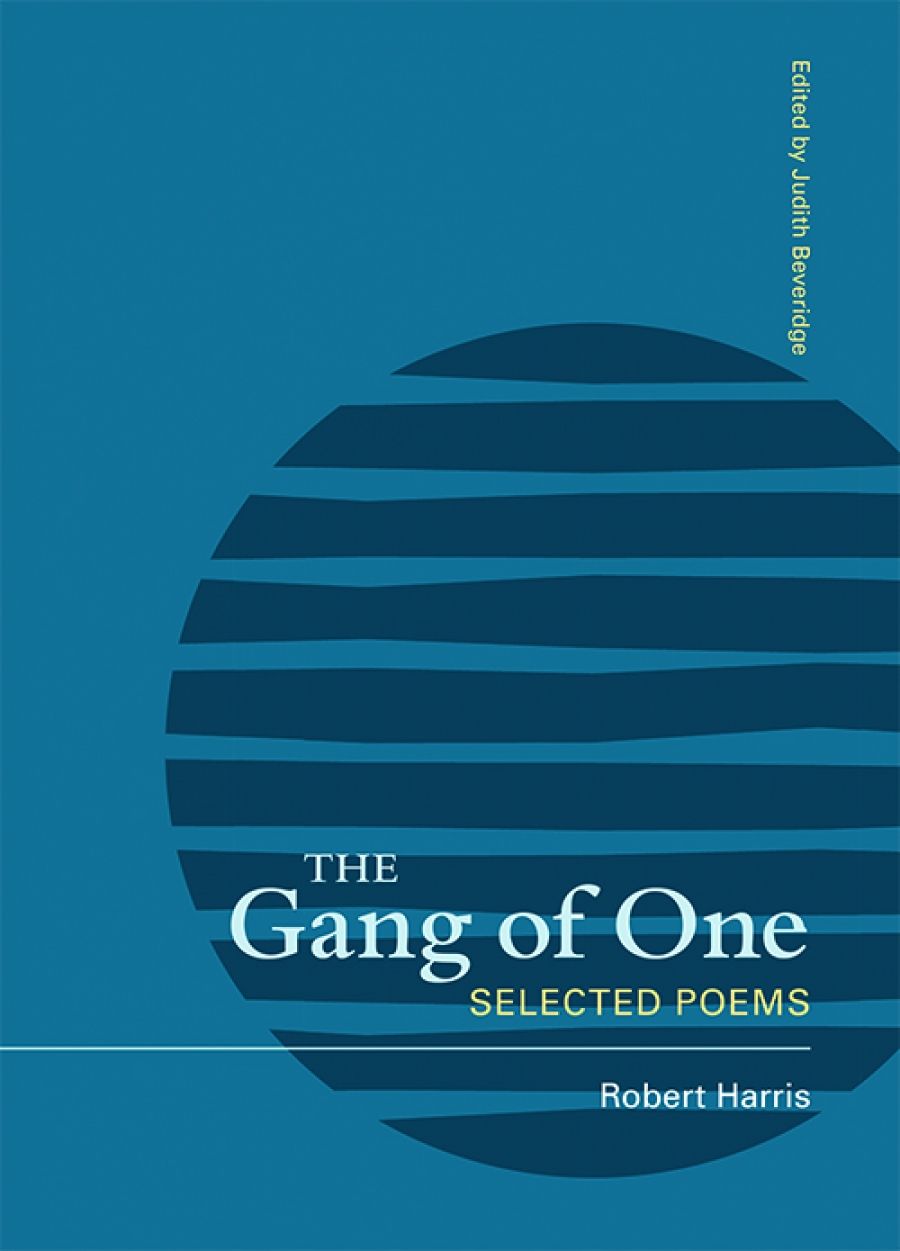
- Free Article: No
- Contents Category: Poetry
- Custom Article Title: Judith Bishop reviews <em>The Gang Of One: Selected poems</em> by Robert Harris
- Review Article: Yes
- Online Only: No
- Custom Highlight Text:
In a letter to a friend, American poet James Wright reflected on the meaning of a Selected Poems for a peer he considered undervalued: ‘It shows that defeat, though imminent for all of us, is not inevitable.’ He quoted ...
- Book 1 Title: The Gang Of One: Selected poems
- Book 1 Biblio: Grand Parade Poets, $26.95 pb, 224 pp, 9780994600226
The Gang of One is a substantial volume, with almost two hundred pages of poetry. The poems were selected by Judith Beveridge and are introduced by Philip Mead. One gathers from this Selected that Harris was a poet who took some time to find his feet. Early influences ranged from the French Symbolist poets to local performance poetry. As the title suggests, he harboured many voices in his singular body. There are dramatic, historical, lyric, religious, and political poets in Harris, in various admixtures. There are echoes of T.S. Eliot in the early ekphrastic poem ‘Concerning Shearers Playing for the Bride’: ‘The cards say / and the mat says / “Play!”’. Elsewhere, Harris’s dramatic and declamatory voice conjures up a version of Auden.
‘Concerning’, like a number of Harris’s earlier poems, gets a little lost in its wanderings. The second half of the poem reads like a strong draft, in which the poet is visibly feeling his way, as if to demonstrate what Theodore Roethke wrote: ‘I learn by going where I have to go.’ Yet the half-hewn nature of this poem is illuminating. It shows how the smooth stone emerges from the rough, like a sculpture by Rodin. Some sections are visionary, and these divulge the poet’s talent:
[…] you call to the stony sides of purpling hills
defeated and somehow more remote in late afternoon’s recession
of vivid, painful light,
call to the fossil,
call to the vein
and lastly call to those shadows
awakening nocturnal birds
Reading the middle and later poems, one sees the early strength distilled. Pivotal poems in this regard are those concerning Harris’s conversion to the Anglican faith from The Cloud Passes Over (1986). Here, Harris discovers a new mood or change of key. After all the metaphors for ‘resonant emptiness’ that the earlier poems had learned to deploy, here instead is the light that ‘crashes in’, that ‘lift[s] off silver slush’; ‘the seashell below, / and overhead / gold’; the feeling of a ‘promise / made at the rain’s origin’. The language and the landscape brighten visibly, even in the presence of the ‘shadows of clouds’:
Even as you left the shadows of clouds
went gliding over the parched,
bright hills,
and rainbow-coloured parrots
flew alongside you.
The Gang of One ends with more than thirty pages of uncollected poems. In ‘Grip’, Harris’s compassionate and perceptive vision paints a scene to rival Les Murray’s ‘An Absolutely Ordinary Rainbow’. A man on the outskirts of life (‘he had the shuffle someone might who is dying’) carries ‘a cat on his shoulder’, its ‘eyes balanced on panic and trust’. The couple is poised on the cusp of disaster as they cross against traffic. Their fierce relationship, the poem suggests, makes onlookers aware that their own lives are smaller in contrast; thus the startling perception: ‘People seemed to ignore them out of envy.’
Other uncollected poems, such as ‘Winter Firesong’, ‘The Motive’, ‘My Irish Grandmother’, and ‘A Horse on the Bus’, are a joy to read. In these, sensation and memory undergo a transformation into vision. In ‘A Horse on the Bus’, Harris sketches, with a delicate and haunting empathy, a group of schoolgirls drawing a horse. The fragmented form of the lines mimics the swaying of the bus and an old maternal absence:
It reminds me
of looking through books at all the
horses which my mother
drew at their age.
So this
is where they have galloped
to.
It is intriguing that the same poet could write ‘Annoyance Poets’, ‘The Bible’, and ‘Christian’. They reveal Harris, even at the height of his career, crouched in his corner – feeling judged for his callings, poetic and religious – and coming out sparring for a poetry that is ‘rare and hard, and frankly good’, with ‘some apprehension / of higher things’. Harris’s dedication to poetry was complete, by the evidence of these poems and his friends’ accounts. Robert Adamson wrote these lines in an elegy for Michael Dransfield, but the same seems true of Harris: ‘That idea of ourselves as poets was an addiction / more terminal than any opiate the chemists could refine.’ Barry Dickins elegised Harris in 2009 with these memorable words: ‘Robert Harris had only known two things in his short life: poverty and poetry. He knew poetry would get him, and it did.’
Given this context, a poem that Harris wrote on Sir Thomas Chaloner the Elder (d.1565) reads as a veiled self-portrait of the poet he desired to be. Harris empathised with the downcast and deplored the aggressions of the world. He was a poet with a heart more civil than fierce:
His verse would speak aloud when
truth was gone
[…]
when he and all tyrant monarchs were
extinct
then would his civil heart swim out
as words swim into translation, one
by one.


Comments powered by CComment